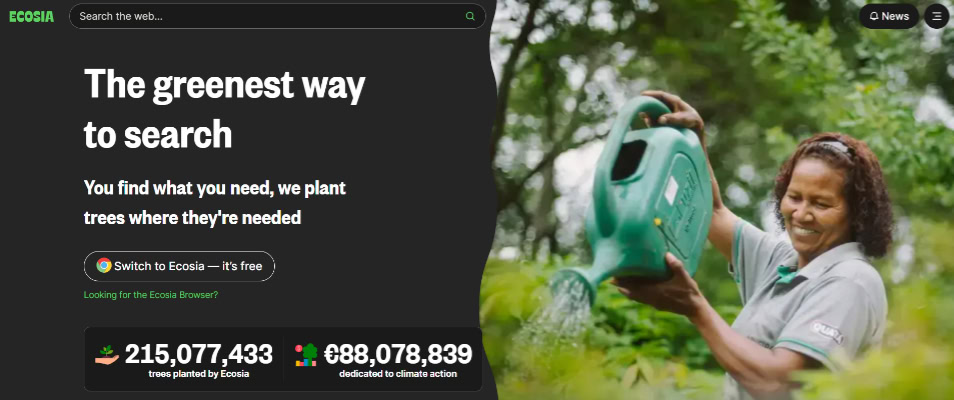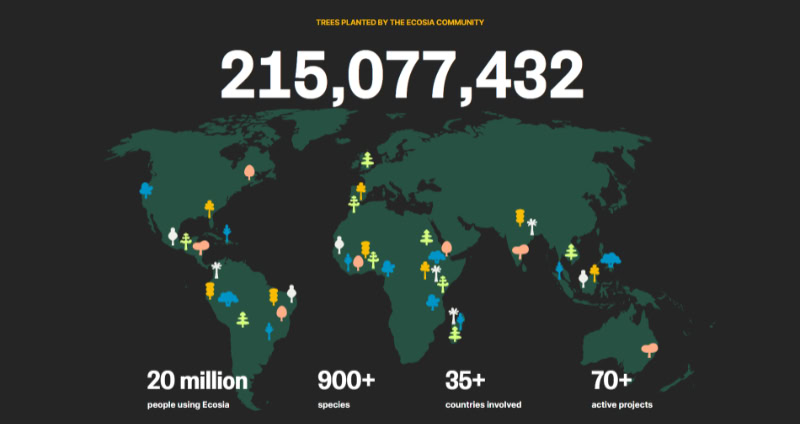Ecosia vs. DuckDuckGo: Privacy or Planet? You Decide

Search engines play a vital role in our online experiences, shaping the way we access and interact with information on the web. Among the myriad options available, Ecosia and DuckDuckGo have emerged as two search engines that go beyond the conventional, each driven by a distinct mission.
Ecosia combines the power of search with environmental activism, using its profits to plant trees and combat deforestation. DuckDuckGo, on the other hand, champions user privacy, ensuring that your searches remain anonymous and your data stays secure.
As conscious consumers in the digital age, understanding the differences between these two search engines can help you align your online activities with your values.
Core Missions and Unique Selling Points
At the core of any successful business lies a well-defined mission that sets it apart from competitors and resonates with its target audience. Ecosia and DuckDuckGo, two search engines that have gained significant traction in recent years, exemplify this principle through their distinct missions and unique selling points.
Ecosia: Supporting Reforestation Efforts
Ecosia, founded in 2009, has made environmental conservation its primary focus. The search engine’s mission is to use the profits generated from search ads to plant trees in areas affected by deforestation.
By partnering with local organizations and communities, Ecosia ensures that the trees planted are native to the region and can thrive in the long term. This innovative approach has attracted users who are conscious of their ecological footprint and want to contribute to a greener planet simply by using a search engine.
Ecosia’s commitment to the environment is evident in its transparent reporting of tree-planting projects, eco-friendly content, and features that encourage users to engage with its mission.
DuckDuckGo: Protecting User Privacy
On the other hand, DuckDuckGo‘s mission revolves around protecting user privacy in an age where data security is a growing concern. Launched in 2008, DuckDuckGo has built its reputation on its commitment to keeping user searches anonymous and preventing the collection of personal data.
The search engine does not track user behavior, nor does it store IP addresses or share information with third parties. This privacy-centric approach has made DuckDuckGo a preferred choice for users who value their online privacy and want to maintain control over their personal information.
DuckDuckGo’s dedication to privacy is reflected in its encrypted searches, privacy-enhancing features, and advocacy for online security and anonymity.
Aligning Services with Core Values
The core missions of Ecosia and DuckDuckGo have a profound impact on how they operate and the services they offer. By aligning their services with their core missions, Ecosia and DuckDuckGo have differentiated themselves in a crowded search engine market.
They have attracted users who share their values and are looking for more than just a generic search experience.
Ecosia’s mission has inspired features like the personal tree counter and regular updates on reforestation projects, while DuckDuckGo’s privacy focus has led to the development of privacy grades and browser extensions that enhance online security.
As a result of their strong missions and unique selling points, both Ecosia and DuckDuckGo have grown steadily over the years, proving that a commitment to values can be a powerful driver of success in the digital age.
Privacy Features and Data Practices

In an era where online privacy is a growing concern, search engines play a crucial role in protecting user data and ensuring secure browsing experiences. Ecosia and DuckDuckGo, while both prioritizing user privacy, approach this issue in distinct ways.
DuckDuckGo’s Privacy Protections
DuckDuckGo is renowned for its robust privacy protections, which form the core of its service. The search engine operates on a strict no-tracking policy, ensuring that user searches remain anonymous and cannot be linked to individual users.
DuckDuckGo does not collect or store any personal information, such as IP addresses or user agent strings, which could potentially identify users.
Moreover, DuckDuckGo’s search results are sourced from various providers, minimizing the risk of user profiling based on search history. The search engine also offers a range of privacy-enhancing features, such as the ability to encrypt user connections to websites, block trackers, and prevent targeted advertising.
Ecosia’s Approach to User Privacy
Ecosia is transparent about the data it collects and how it is used. The search engine automatically collects data required by its search partners, Microsoft Bing and Google, to prevent bot attacks and ad fraud, which includes IP addresses and search terms.
Ecosia anonymizes this data after a maximum of 7 days.
For users who receive Google search results and ads, Ecosia seeks consent to set a cookie on the user’s browser and access local storage on the device. If the user does not agree, non-personalized results from Microsoft Bing are provided.
Ecosia also seeks consent to implement Microsoft Clarity when users receive results from Microsoft Bing. Microsoft Clarity captures user interactions with the website through behavioral metrics in individual search sessions, which are not tied to a user profile.
This information is used for site and advertising optimization and fraud protection.
Ecosia provides users with the choice to opt-out of data collection entirely, giving them control over their privacy preferences. The search engine is committed to protecting user privacy and adheres to strict security protocols to safeguard user information from unauthorized access or breaches.
Comparing Data Retention and Usage
DuckDuckGo’s strict no-tracking policy means that it does not retain any user data, and search queries are not associated with individual users. This ensures that user privacy is protected from potential breaches or misuse of data.
Ecosia, on the other hand, retains anonymized user data for a limited period to improve its search algorithms and provide more relevant results. IP addresses are anonymized after a maximum of 7 days, while its search partners, Microsoft Bing and Google, anonymize IP addresses after 6 months and 9 months, respectively.
Both search engines are committed to protecting user privacy and do not sell user data to third parties for advertising or other purposes. They also adhere to strict security protocols to safeguard user information from unauthorized access or breaches.
Search Functionality and Results

When comparing search engines, it’s essential to consider the quality and relevance of the search results they provide. Ecosia and DuckDuckGo, while both offering user-friendly interfaces and privacy-focused features, differ in their approach to sourcing and presenting search results.
Sources of Search Results
Ecosia and DuckDuckGo rely on different sources to generate their search results. Ecosia primarily uses Bing, Microsoft’s search engine, to power its searches.
By partnering with Bing, Ecosia can provide users with a comprehensive search experience while focusing on its core mission of environmental conservation.
On the other hand, DuckDuckGo sources its search results from multiple providers, including Bing, Yahoo, and its own web crawler, DuckDuckBot. This diverse approach allows DuckDuckGo to generate more varied and comprehensive search results, reducing its dependence on any single provider.
Quality and Relevance of Search Results
The quality and relevance of search results are crucial factors in determining the effectiveness of a search engine. Ecosia, through its partnership with Bing, delivers search results that are generally accurate, up-to-date, and relevant to users’ queries.
However, some users may find that Ecosia’s results are not as extensive or diverse as those provided by larger search engines like Google.
DuckDuckGo’s search results are known for their accuracy and relevance, thanks to the search engine’s use of multiple sources and its proprietary ranking algorithms. DuckDuckGo’s results are often praised for their quality, particularly in terms of providing users with the most relevant information for their queries.
Additional Search Features and Tools
In addition to standard search functionality, Ecosia and DuckDuckGo offer a range of features and tools to enhance the user experience. Ecosia provides users with the ability to filter search results by date, language, and region, as well as the option to view image and video results separately.
DuckDuckGo offers a variety of search shortcuts, known as “bangs,” which allow users to quickly search specific websites or categories directly from the search bar. For example, typing “!w” followed by a search term will search Wikipedia directly.
DuckDuckGo also provides instant answers for queries related to weather, calculations, and other common topics.
Environmental Impact

As concerns about climate change and environmental degradation continue to grow, companies across various industries are increasingly taking action to minimize their ecological footprint and promote sustainability. Ecosia and DuckDuckGo, two search engines known for their commitment to social responsibility, have integrated unique environmental initiatives into their core business models.
Ecosia’s Tree-Planting Program
Ecosia’s most notable environmental initiative is its tree-planting program. The search engine uses a significant portion of its profits from advertising revenue to fund reforestation projects in various parts of the world.
Ecosia plants trees in areas affected by deforestation, such as the Amazon rainforest, the Sahel region of Africa, and Indonesia.
As of September 2024, Ecosia has planted over 215 million trees across more than 35 countries. The search engine’s tree-planting efforts have not only contributed to the restoration of degraded ecosystems but have also supported local communities by providing employment opportunities and promoting sustainable land use practices.
Ecosia is committed to transparency in its tree-planting program. The company regularly publishes financial reports detailing its income, expenses, and the number of trees planted.
DuckDuckGo’s Environmental Initiatives
DuckDuckGo has implemented a comprehensive approach to reduce its environmental impact. As of 2020, the search engine has achieved carbon negative status, retroactively offsetting its emissions dating back to its founding in 2008.
This means that DuckDuckGo is not only neutralizing its current carbon footprint but also compensating for its past emissions.
To accurately estimate its carbon footprint, DuckDuckGo has developed innovative estimation methods that account for the full scope of its emissions, including those from its supply chain and distributed workforce. The company has taken responsibility for all emissions it generates that are not already net zero, regardless of their categorization.
This includes calculating the environmental impact of staff home offices, marketing campaigns, and even individual search queries.
DuckDuckGo collaborates with CNaught, a carbon-offset startup, to invest in a diverse portfolio of carefully vetted projects aimed at reducing emissions, promoting conservation, and facilitating long-term carbon removal. The search engine dedicates funds equivalent to 125% of its estimated net emissions to these initiatives.
Furthermore, DuckDuckGo matches this amount in annual contributions to Carbonfuture, supporting the advancement of carbon removal technologies.
By taking a comprehensive and proactive approach to environmental responsibility, DuckDuckGo demonstrates its commitment to sustainability and sets a positive example for other companies in the tech industry.
Comparing Overall Ecological Footprints
When comparing the overall ecological footprints of Ecosia and DuckDuckGo, it is clear that both search engines are taking meaningful steps to reduce their environmental impact. Ecosia’s tree-planting program has a direct and tangible impact on the environment, actively contributing to the restoration of ecosystems, the conservation of biodiversity, and the mitigation of climate change.
DuckDuckGo’s carbon negative initiatives, including its comprehensive emissions estimation, carbon offsetting, and investments in carbon removal technology, demonstrate a strong commitment to sustainability. By pioneering new estimation techniques and redefining its approach to emissions responsibility, DuckDuckGo sets a high standard for other companies to follow.
Conclusion
Ecosia and DuckDuckGo, two search engines with unique missions and values, offer users compelling alternatives to mainstream options. While both prioritize user privacy and environmental responsibility, they differ in their core focus and the ways they contribute to a better world.
Ecosia’s commitment to reforestation and its transparent tree-planting program make it an attractive choice for users who want their searches to have a direct, positive impact on the environment. By using Ecosia, individuals can actively participate in restoring ecosystems and supporting communities affected by deforestation.
On the other hand, DuckDuckGo’s strong emphasis on privacy protection and its carbon negative initiatives appeal to users who value their online security and want to minimize their digital footprint while supporting sustainable practices. DuckDuckGo’s comprehensive approach to emissions reduction and investment in carbon removal technologies sets a high bar for environmental responsibility in the tech industry.
In the end, the choice between Ecosia and DuckDuckGo depends on individual priorities and values. Those who are passionate about reforestation and want to see tangible results from their searches may prefer Ecosia, while those who prioritize privacy and want to support a company with a comprehensive approach to sustainability may lean towards DuckDuckGo.
Regardless of the choice, both Ecosia and DuckDuckGo demonstrate that search engines can be powerful tools for positive change, combining functionality with social and environmental responsibility.


